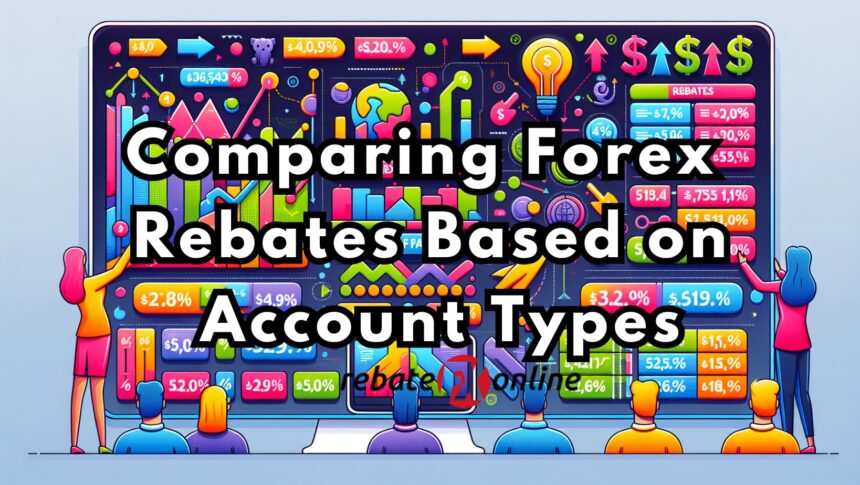In the Forex trading world, rebates have become an essential benefit for traders aiming to reduce costs and maximize profits. Different account types offer varying rebate structures, each with unique features tailored to specific trading needs. Understanding how rebates vary across account types can help traders choose the best fit for their goals. In this article, we will explore the rebate structures associated with various Forex account types, including Standard, ECN, and other popular account options.
1. What is a Forex Rebate?
A Forex rebate is a partial refund that traders receive on the spread or commission of each trade, even if the trade is a loss. Brokers often offer these rebates to incentivize more trading activity. Rebates allow traders to recover some of their trading costs, enhancing profitability over time.
2. Types of Forex Accounts and Their Rebate Structures
Different account types cater to various trading preferences and volumes. Let’s break down the most common account types and their associated rebate structures.
a) Standard Accounts
Standard accounts are the most common type of Forex account. They are typically designed for beginner or intermediate traders and often feature fixed or floating spreads.
- Rebate Structure: For standard accounts, rebates are generally calculated as a fixed amount per trade or a portion of the spread paid on each trade. For example, a trader may receive $2 for each lot traded.
- Advantages: The rebate structure in standard accounts is straightforward and easy to understand, making it ideal for traders who value consistency.
- Disadvantages: Standard accounts often have higher spreads than other account types like ECN accounts, meaning that while traders receive a rebate, the higher spreads may impact overall profitability.
b) ECN Accounts
Electronic Communication Network (ECN) accounts are designed for traders looking for tighter spreads and direct market access. ECN accounts generally cater to experienced traders and those trading in high volumes.
- Rebate Structure: Rebates in ECN accounts are usually calculated based on the commission paid per trade. For instance, a trader may receive a rebate of 10-20% of the commission fee for each lot traded.
- Advantages: ECN accounts have very low spreads, often close to zero, which means traders benefit from more favorable entry and exit points. Rebates on commissions allow traders to offset the cost of trading further.
- Disadvantages: Since ECN accounts charge commissions instead of spreads, the rebates tend to be smaller in absolute terms compared to standard accounts, but they can still contribute significantly to reducing trading costs.
c) Mini and Micro Accounts
Mini and micro accounts are designed for traders who want to start with smaller capital, often with smaller trading lot sizes such as 0.1 or 0.01 lots.
- Rebate Structure: Rebates in mini and micro accounts are usually lower per lot compared to standard accounts, but the rebate structure is often proportional to the lot size. For example, instead of $2 per lot, a trader may receive $0.20 per micro lot traded.
- Advantages: Rebates on mini and micro accounts provide an added incentive for new traders or those trading with smaller balances, allowing them to benefit from reduced trading costs without committing to larger lot sizes.
- Disadvantages: The total rebate amount tends to be smaller given the lower trading volume and smaller lot sizes, so the financial impact is generally less substantial than for standard or ECN accounts.
d) VIP or Professional Accounts
VIP or professional accounts are typically reserved for high-volume traders or those with large deposits, often with access to dedicated support and lower trading fees.
- Rebate Structure: Rebates in VIP accounts tend to be higher on a per-lot basis, and traders may receive custom rebate rates based on their trading volume. Brokers may offer additional discounts or incentives in these accounts.
- Advantages: VIP accounts often have the most attractive rebate structures, with brokers willing to negotiate rates based on trading volume, providing substantial cost savings for active traders.
- Disadvantages: These accounts often require high minimum deposits, which may be prohibitive for smaller traders.
e) Islamic or Swap-Free Accounts
Islamic accounts, also known as swap-free accounts, are designed for traders who follow Islamic principles, as they do not incur swap or interest fees.
- Rebate Structure: Rebates for Islamic accounts vary widely, as some brokers offer reduced rebates to offset the absence of swap fees, while others offer the same rebate rate as standard accounts.
- Advantages: Traders can enjoy cost-saving benefits on each trade, similar to standard accounts, without incurring any overnight fees.
- Disadvantages: Some brokers may reduce rebate amounts or charge additional administrative fees to compensate for the lack of swap charges, which can affect overall profitability.
3. Key Considerations When Choosing an Account Based on Rebates
When selecting an account based on rebate options, traders should consider:
- Trading Volume: Higher-volume traders can benefit more from accounts with better rebate structures, such as VIP or ECN accounts.
- Lot Size: Smaller traders may find better value in standard or mini accounts due to the consistent rebate structure per lot.
- Trading Strategy: Scalpers and day traders may benefit more from ECN accounts with rebates on commission, while swing traders may prefer standard accounts with rebates on spread.
- Deposit Requirements: Some accounts, like VIP accounts, have high minimum deposits, so traders should choose based on their available capital.
4. Conclusion
Forex rebates are a valuable tool to enhance profitability by reducing the effective cost of trading. Each account type offers unique benefits, and the best choice depends on the trader’s volume, strategy, and goals. By understanding how rebates differ across account types, traders can choose the right account to optimize their costs and maximize their earnings in the Forex market.
This guide should help traders understand the differences in rebate structures and make informed decisions when choosing an account.

